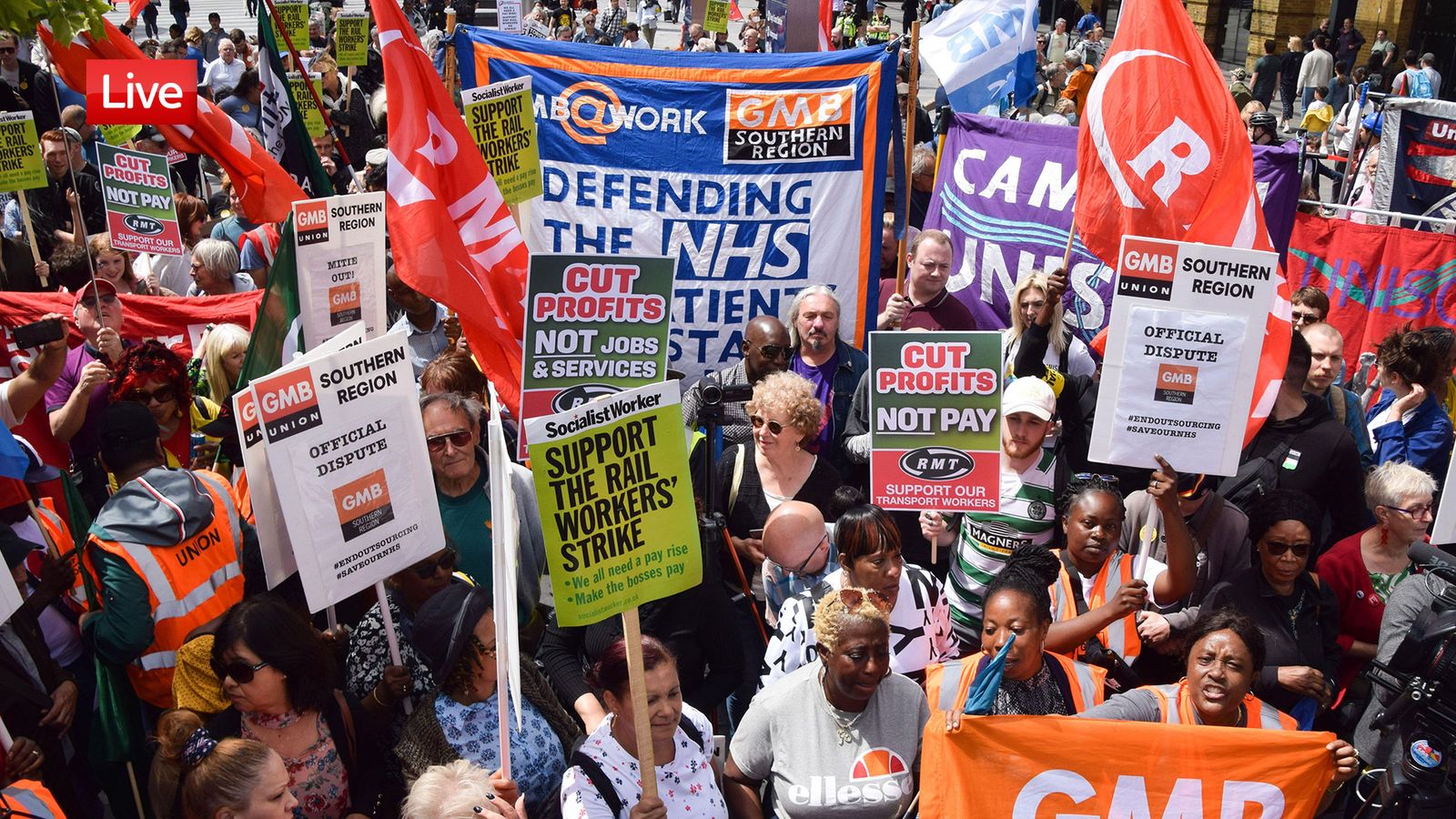Unions could coordinate strike action across NHS for ‘maximum impact’, GMB boss says

Union leaders could coordinate industrial action across the NHS this winter to cause “maximum impact”, the head of the GMB has suggested.
Andy Prendergast, the GMB national secretary, said health workers have had enough of “public school boys who run the government and simply don’t care” about their pay demands.
More than 10,000 ambulance workers from the GMB voted to strike yesterday, following in the footsteps of nurses in opting to walk out.
Kay Burley puts your questions to union leaders – politics live
Asked if there will be a “coordinated strike” in the health service, Mr Prendergast told Sky News: “We will be talking to the other unions.
“We know that the nurses have got their first ballot in over 100 years. We know that our colleagues in Unite, in Unison are currently delivering ballots.
“So we’ll be looking to make sure this has the maximum impact.”
It was put to Mr Prendergast that the safety of patients could not be guaranteed if there is coordinated strike action between unions and the NHS.
He argued their safety is not being guaranteed now due to the staffing crisis, with poor pay driving many out of the profession.
Advertisement
“One third of our members in the ambulance service believe that they have been involved in a delay that has led to a patient dying, so this isn’t a situation where this is a service that runs perfectly well,” he said.
NHS ‘dying on its feet’
“This is a service that’s dying on its feet and our members are actually standing up and the public of Britain should support them. This is a matter of a life or death situation.”
Mr Prendergast said NHS workers “work extremely hard, often for wages that a lot of people wouldn’t get out of bed for”.
He added: “Ultimately they are saying enough is enough. It’s time for them to take action. This is the one thing that they can do to try and improve patient safety, to try and improve the terms conditions, to try and deal with 135,000 vacancies that we have among a service that we rely on.”
Paramedics, emergency care assistants, call handlers and other staff are set to walk out in nine trusts:
Please use Chrome browser for a more accessible video player
0:34
‘Inflation-busting pay rises are unaffordable’
The industrial action is due to take place before Christmas, with the union planning to meet reps in the coming days to discuss dates.
Thousands of ambulance workers in Unison, the UK’s biggest trade union, also intend to take industrial action before Christmas.
Up to 100,000 nurses from the Royal College of Nursing are also set to stage a mass walkout in December, one of the busiest months for the NHS.
The army has been placed on stand by in case it is needed to fill roles of NHS workers on strike days.
Coordinated strike ‘can speed up negotiations’
Dr Emma Runswick of the British Medical Association told Sky News that coordination between unions will help protect patients as they can discuss between themselves how to cover urgent and emergency care.
She added that an effective coordinated strike “will help to speed up negotiations”.
“We want there to be an impact on the employers and on the government to bring them to the table to negotiate with us. And if we coordinate and if we’re effective, the government and employers will negotiate faster. And that’s better for us and better for patients in the long term.”
The UK is facing a wave of strikes this winter as workers from different industries are set to walk out over pay and conditions
Nurses, rail workers, civil servants and teachers are among the tens of thousands expected to take industrial action as a recession grips the UK and the cost of living rises.
Read More:
Which industries are striking this winter and why?
Eurostar security staff to strike in December, RMT union announces
Wage price spiral ‘nonsense’
Ministers have been criticised for refusing to negotiate with unions, with Business Secretary Grant Shapps saying meeting their pay demands would lead to a wage inflation “spiral”.
Eddie Dempsey, assistant general secretary of the RMT, which covers the transport sector, rubbished that argument.
“This idea that there’s going to be a wage spiral is nonsense because wages have been falling as a share of wealth in this country – what goes to wages and what goes to profits,” he said.
Mr Dempsey said that now, wages only account for around 8% to 12% of unit costs.
“There was a study done by the Bank of England… about the risk of wage-induced inflation across Western economies.
“They said wages right now represent no risk or actually negative figures, so they’re part of deflationary figures because people have got less money.
“I don’t think they’re actually worried about a wage price spiral. What they’re worried about is a shift in class power. They’re worried about trade unions and ordinary working people having the ability to bargain for better wages. That’s what they’re worried about.”
Rail union ‘hopeful’ of deal to end strikes
Mr Dempsey said his union has been in negotiations for longer than six months and “every time we feel like we are making headway it has felt like the rug has been pulled out from under our feet”.
However he said there there is “definitely a change of tone” with the new Transport Secretary Mark Harper and the RMT is “hopeful” a deal can be reached.